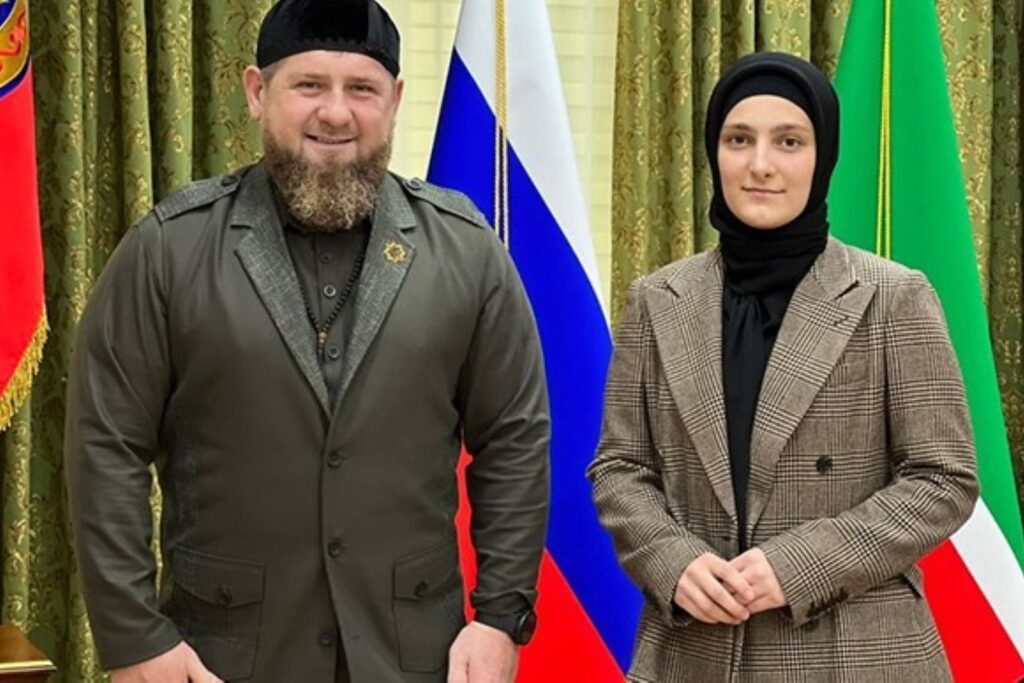Just one woman has been appointed to a newly established council for women’s rights in Chechnya: Aishat Kadyrova, the daughter of Chechen head Ramzan Kadyrov.
Kadyrova, 24, also serves as the republic’s minister of culture. On 2 October, Kadyrov announced that his daughter had been nominated for appointment to the role of deputy prime minister ‘for social issues’.
Kadyrova is the Head of Chechnya’s eldest daughter. In 2020, she became Chechnya’s deputy minister of culture, becoming minister of culture in 2021, at the age of 22. Her husband, Viskhan Matsuev, was appointed minister of culture in July.
Kadyrova has been sanctioned by the USA, the European Union, and Japan.
The women’s rights council is headed by Chechnya’s current deputy prime minister for social issues, Adam Alkhanov, who is married to Kadyrov’s second daughter, Khadizhat.
According to RFE/RL, the women’s rights council also includes Minister of Labour, Employment, and Social Development Usman Bashirov, Bashirov’s deputy Tamerlan Ibakov, Minister of Education Khozh-Baudi Daayev, Minister of National Policy, External Relations, Press, and Information Akhmed Dudayev, Health Minister Suleiman Lorsanov, and Minister of Physical Education, Sports, and Youth Policy Isa Ibragimov.
Russian state news agency TASS in May wrote that the Russian government had approved a strategy to advance women’s rights in 2023–2030. The plan addressed women’s health, social issues, increasing women’s roles in society, expanding women’s participation in Russia’s socio-economic development, and strengthening women’s ‘socio-political positions’.
Systematic violations
Women’s rights are systematically severely violated in Chechnya, with the authorities frequently either covering up or actively taking part in such violations.
Human rights organisations report frequent cases of domestic violence, murder, maternal rights violations, persecution, ‘honour’ killings, and forced genital mutilation in the republic.
The Stichting Justice Initiative, a rights group working in Russia, in 2018 published a study on ‘honour’ killings in the North Caucasus, noting that the topic remained taboo and was widely considered a ‘private family matter’. It noted that between 2012 and 2017, nine known instances of honour killings had taken place in Chechnya.
According to a study by the Russia-based Crew Against Torture, from 2009–2020, 58 similar cases were registered against 73 victims.
Cases of women fleeing their homes and seeking help from human rights organisations are frequent, with many then appearing to be abducted and brought back to Chechnya, often with the assistance of local and Chechen law enforcement agencies.
In late August, Seda Suleymanova fled Chechnya, reportedly for fear that she would be killed by her family. Russian media reported that she was abducted from the place where she was staying in Saint Petersburg, and taken to Grozny, where she was detained on charges of theft.
[Read more: Chechen domestic abuse victim ‘abducted and sent to Grozny’]
While Chechen Human Rights Commissioner Mansur Soltayev spoke to Suleymanova, claiming that she stated that she was well, civil rights activists have warned that she was in severe danger in Chechnya.
In July, Elsa Musayeva was similarly kidnapped from Sterlitamak, west Russia, having fled Chechnya assisted by human rights activists. After being taken to Chechnya, Musayeva recorded a video asking human rights activists to stop looking for her.
Women also often face issues gaining custody of or access to their children as, in Chechnya, it is customary for a child to remain with the father and the father’s family in the event of a divorce.
A study by the ‘Motherless Caucasus’ project found that 80% of women from the North Caucasus are aware of the tradition of the father’s family taking custody of children after a divorce, with 17% of respondents having personally faced the risk of their children being taken away.
A 2014 survey on violations of women’s rights in the North Caucasus found that, in answer to the question ‘Do you personally know women who are regularly beaten by their husband?’, 92.8% of women in Chechnya gave an affirmative answer. It also stated that in 87% of cases of women making domestic violence complaints, law enforcement forces refused to initiate criminal cases.




 3 October 2023
3 October 2023



